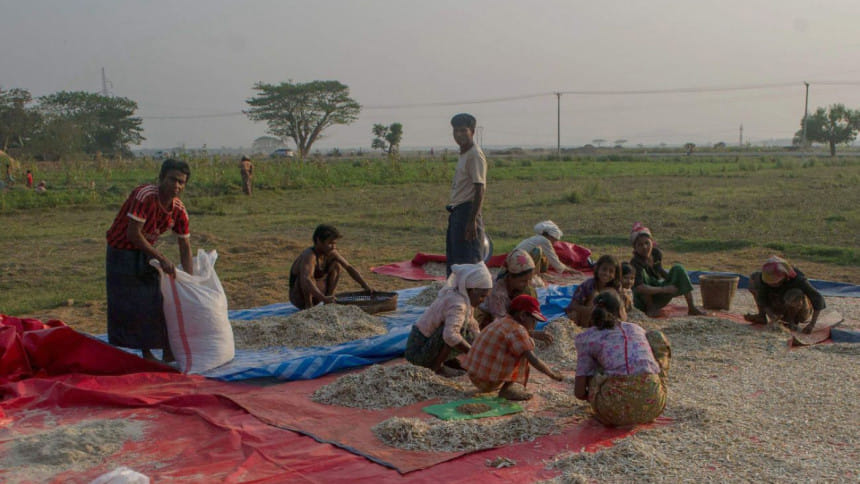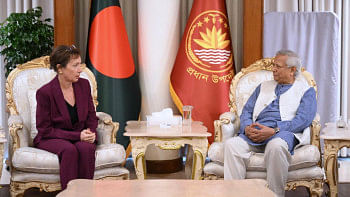No rule of law for Rohingyas

By the twisted standards of Myanmar's Rakhine state, Abdullah is one of its more fortunate Rohingya residents.
The 34-year-old is alive, his village is intact and he is able to make a living -- albeit a meagre one -- in his homeland as a farmer.
Abdullah's Rohingya Muslim minority are disappearing fast from Myanmar.
Some one million of them -- around two-thirds of their entire stateless community -- have been forced over the border to refugee camps in Bangladesh by successive waves of persecution.
The latest has expelled some 700,000 Rohingya since August, when the army launched a campaign of violence that the UN says amounted to "ethnic cleansing".
Abdullah's village of Shan Taung is near the temple-studded town of Mrauk U, not far from the epicentre of the most recent crackdown in northern Rakhine but partly sheltered from its worst excesses by a range of forested mountains.
He is among the 500,000 Rohingya that the UN estimates remain in Myanmar, some confined to camps after previous rounds of violence while others are spared by wealth, luck or -- like the villages in Abdullah's area -- simply by isolation from the latest military campaign.
Yet their lives are still shaped by tension and fear in a mainly-Buddhist country that has methodically stripped the Muslim minority of legal rights and security.
The status of the Rohingya in Rakhine hangs by a thread in the wake of the army crackdown, which has seen Myanmar troops and ethnic Rakhine mobs accused of burning Rohingya villages, and of raping and murdering their residents.
Shan Taung, with its 4,500-strong Rohingya population, appears peaceful.
Fishermen dry their catch in the sun, farmers bring in the rice paddy and children play at the side of the road.
But fear has sharply segregated the Rohingya Muslims and the ethnic Rakhine Buddhists living nearby.
The Rohingya say they risk a beating -- or worse -- if they stray into territory the Rakhine regard as their own, while few trust the police to protect them.
It wasn't always this way, says Abdullah, explaining he once had Rakhine friends and stayed with a Rakhine family while studying at university in the state capital, Sittwe.
"They no longer treat me like they used to," he tells AFP.
Around 150,000 Rohingya are thought to still be living in northern Rakhine, spread among disparate villages spared in the violent crackdown.
But rights groups say many of those communities are hungry and scared, unable to work freely and hemmed in by hostile neighbours, as the army beefs up its bases around them.
Ye Htut, the administrator of Maungdaw, the most populous district in the north, played down strife between the communities that remained.
"Muslims still living here don't say they are afraid," he told reporters. "Many houses are still left."
Further south, another 130,000 Rohingya fester in internment camps, a grim legacy from rounds of inter-communal violence since 2012.
Another 200,000 fare only marginally better, living in their own villages but under restrictions on movement that UN spokesman Pierre Peron says "severely compromise" basic rights and access to health and education.
"People are afraid every step they take," says Yangon-based Kyaw Soe Aung, Secretary General of the Rohingya-focused Democracy and Human Rights Party.
"There is no security and rule of law for Rohingya and Muslims."
Officially the "Rohingya" do not exist in Myanmar and as a result are denied citizenship.
Rohingya seeking citizenship must agree to be classified as "Bengali" in a notorious verification process which denies them constitutional rights as a separate ethnic minority and leaves them vulnerable to expulsion.
Critics say the National Verification Card (NVC) they are pressed to sign up for is less a pathway to citizenship than a means of control.
From 2010 until the end of 2017, government statistics show only around 7,600 Rohingya signed up and only a couple of hundred have obtained citizenship.
Ko Ko, not his real name, is one of the few Rohingya to hold a valid ID card -- sporting the term "Bengali".
The 20-year-old says, however, that means he must regularly grease pockets and wait longer when dealing with anybody in any position of authority because he is automatically put at the bottom of the pile.
He and a friend collect data about alleged atrocities in Rakhine and also try to counter anti-Rohingya "fake news" with a website that has some 10,000 hits a week.
His father worries about his activist work and wants him to seek asylum overseas but Ko Ko refuses.
"We have to get back our citizenship," he says.
“I will work for change. I'm doing the right thing."

 For all latest news, follow The Daily Star's Google News channel.
For all latest news, follow The Daily Star's Google News channel. 



Comments